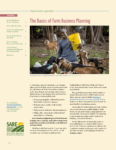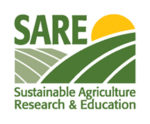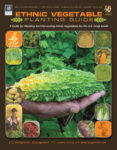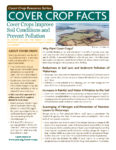Showing 41-50 of 302 results

The Basics of Farm Business Planning
Sustainable farming and ranching means taking care of the land, the environment, people and the community, while the farm business makes a profit. Many farmers and ranchers choose sustainable farming and ranching as a lifestyle that reflects their values. Common goals include: Farm business planning is critical because it helps you to identify and achieve […]

SARE Fellows Program Temporarily On Hold
SARE Outreach and our national partners have made a difficult decision to temporarily suspend the SARE Fellows program. We will not be accepting Fellows applications, beginning in 2025. SARE Fellows, which began in 2007, has been favored by agricultural professionals for providing professional development opportunities through national study tours focused on sustainable agriculture. However, Fellows […]

Ethnic Vegetable Planting Guide: A Guide for Planting and Harvesting Ethnic Vegetables for the U.S. Deep South
The Southern University Agricultural Research and Extension Center (SUAREC) Ethnic Vegetable Planting Guide is intended to honor the cultural traditions of such vegetables and to teach the reader how to incorporate ethnic vegetables into their garden repertoire. Some examples include, hibiscus roselle, molokhia, sweet potato greens, amaranth, and many others.
Research and Education Reveals Sustainable Cost-Cutting Option for Forage Production
Bermudagrass has long served as a cornerstone forage for hay production and livestock grazing in the Southeastern United States, but nitrogen fertilizer used in its production is a costly input that can pose risks to soil, water and air quality. In response, Auburn University’s Dr. Leanne Dillard spearheaded a Southern SARE Research and Education grant […]

SARE Awards $8M to Food Loss and Waste Projects
The USDA recognizes the impacts of food loss and food waste on food security and the environment. USDA, in concert with agency partners, is working toward the goal of reducing food loss and food waste by 50 percent by 2030. In the latest effort in reduction activities, the Sustainable Agriculture Research and Education (SARE) program […]
Producer Partnerships Demonstrate the Benefits of Integrated Systems: Increased Profits and Soil Health
In the semiarid climate of the Great Plains, persistent drought is increasingly contributing to crop failure and soil erosion. A recent North Central SARE Research and Education grant in Kansas demonstrated how integrating crops, livestock and cover crops could help some producers offset revenue loss and failing crops. Kansas State University’s Dr. Augustine Obour partnered […]
Investment in Farmer to Farmer Training Cuts Costs, Improves Safety
Proper management of postharvest handling practices is key to efficiency and safe working conditions on many farms. But small- to moderate-sized producers often struggle to keep pace with increasingly stringent rules that may vary by state or by county. One successful SARE-funded project rose to the challenge and provided hundreds of thousands of farmers with […]

SARE Seeks Web Services Developer
Sustainable Agriculture Research and Education (SARE) invites applications for this 12-month, renewable, Web Services Developer to work in the SARE National Reporting, Coordinating and Communications Office (NRCCO) located in College Park, Md. The NRCCO is SARE’s main outlet for providing support to national sustainable agriculture grant and outreach programs. SARE’s main Information Technology (IT) platforms include the Grant Management […]

Ecosystem Services from Cover Crops
The Ecosystem Services from Cover Crops resources found on this page include a series of fact sheets, three infographics and one PowerPoint slide set. Together, these resources address the role of cover crops in nutrient management, erosion, infiltration, soil organic matter, supporting wildlife and beneficial insects, and carbon sequestration. They are available for use by educators, […]

Cover Crop Image Library
Images, Illustrations and Presentations This page includes free resources educators and farmers can use in outreach and educational activities related to cover crops. Available resources include a database of cover crop images, ready-made PowerPoint presentations on cover crop topics, and soil health illustrations. Cover Crop Image Library The SARE Cover Crop Image Library is hosted […]